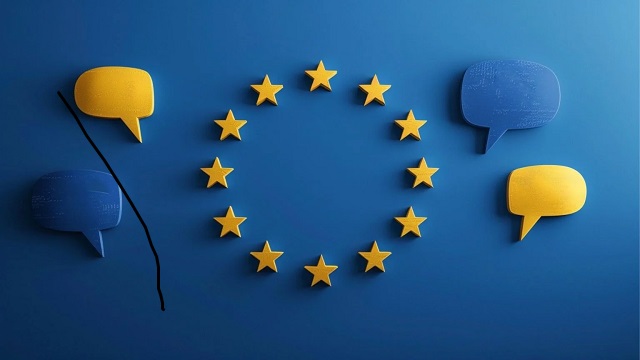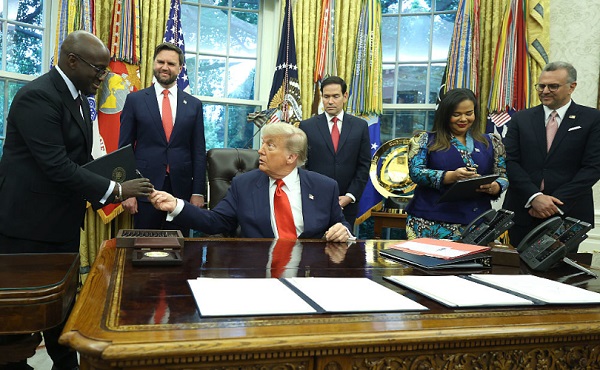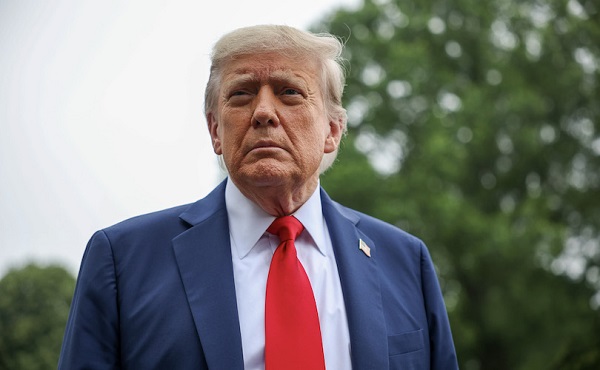Censorship Industrial Complex
Newly Released Documents Reveal Big Tech Limited Millions of Posts During EU Elections

From Reclaim The Net
|
Ah, elections—the pinnacle of democracy where the common folk cast their ballots and, ideally, choose their fate. But hold onto your hats, because behind the grandeur of the European Parliament elections this year lurked a very different sort of governance, one executed not in the open streets but in algorithmic backrooms. Welcome to the Age of Censorship-as-a-Service, brought to you by our ever-dependable friends at Meta, Google, and TikTok.
Meta’s Mission: Make the Truth More… Manageable
Let’s begin with Meta. In a move that feels like something out of a dystopian satire, Meta proudly announced they had reduced the reach of tens of millions of posts across Europe. They wielded over 150,000 Facebook fact-checking articles to de-escalate the virality of 30 million pieces of content.
According to Meta, this wasn’t censorship—no, it was a mere “scaling of the work of independent fact-checkers.” The way they tell it, this was all in the name of maintaining “informed and reliable discussions.” Ah, reliable discussions, where only pre-approved, EU-certified opinions are allowed to flow freely.
Of course, official government statements and the edicts from the holy temples of global health organizations were entirely exempt from Meta’s moderating fervor. After all, why impede the credibility of those who are never wrong—except, of course, when they are, but let’s not get hung up on inconvenient details like that.
On Instagram, another Meta product, this brave new moderation mission persisted. The platform used 39,000 fact-checking articles to put the brakes on nearly a million posts. That’s right—one million “potentially hazardous” thoughts and opinions that, for the good of humanity, needed a little algorithmic throttle. And if you were wondering, it wasn’t just the memes of conspiracy theorists—they made sure that you, your grandma, and that neighbor with too many political opinions got the message too: “Play nice, or we’ll see to it no one hears you.”
TikTok: Suppressing, But Make It Fashionable
Meta wasn’t the only digital nanny keeping Europeans in line. Over at TikTok, the playbook got even hazier. The platform took pride in admitting that it restricted misleading posts—though, unlike Meta, TikTok kept the numbers conveniently vague. You see, their strategy was more about “awareness,” guiding content creators with a gentle algorithmic shove away from the tempting edges of disinformation. How thoughtful.
As if to prove their dedication to curated reality, TikTok also pointed Irish users in the direction of fact-checks from TheJournal.ie, an outlet that coincidentally receives EU funding. No conflict of interest there, right? Just an honest effort to “raise awareness.” And while TikTok didn’t offer up the numbers, we can be assured that plenty of thumbs danced across phone screens only to find their intended messages conveniently dulled down or disappeared.
Google: Where Terms of Service Are Optional
And then we have Google, that beacon of a supposedly neutral search engine—except when it isn’t. Reports show that YouTube, under Google’s magnanimous ownership, automatically deboosted videos that complied with their very own terms of service. Yes, you read that right. Even when content passed muster by their own rulebook, some unseen hand deemed it “unworthy.” Google tells us this was to curb the spread of misinformation. A noble aim, except for that pesky issue of who gets to decide what counts as misinformation—and why.
Critics, like Tom Vandendriessche, an MEP for Patriots for Europe, have not been fooled by the big, earnest proclamations of “integrity protection.”
Vandendriessche—whose party has fought and won against Big Tech’s silencing efforts—paints a stark picture of unchecked power: tech companies with unprecedented influence, deciding who gets heard and who doesn’t.
“This could lead to an era of ‘techno-communism,'” Vandendriessche argued to Brussels Signal, where an unelected cabal decides what constitutes reality for the rest of us. A “techno-communism” where, if your thoughts don’t align with the given narrative, they might as well not exist.
It’s not like Vandendriessche is shouting into the void, either. His criticism comes backed by experience, his party having already tasted the bitter fruits of deplatforming. If a democratically elected official can’t even get his voice out there without tech giants intervening, what hope is there for the average citizen with an inconvenient truth?
The EU’s Seal of Approval: Trust Us, We’re Here to Help
But let’s not forget the EU brass, who are, predictably, patting Big Tech on the back. Věra Jourová seems to believe they’ve stumbled onto some grand new way to “protect the integrity of elections.” Their stance on Big Tech’s secretive influence campaign was remarkably sunny—because nothing says “protecting democracy” like a few ultra-rich corporations quietly deciding what can or cannot be said during election season.
What’s fascinating is the conviction with which the EU spins this story. They genuinely believe—or want us to believe—that this centralized control is for our benefit, a way to combat the terrifying specter of “disinformation.” Clearly, the best way to fight misinformation is to silence millions of voices, all while exempting the officials and organizations whose statements are apparently beyond reproach. Trust us, they say: We’re only limiting the information you receive for your own good.
|
|
|
|
Since you’re here, it’s clear you value Reclaim The Net. Today, we’re inviting you to become a paid supporter. Although we rely on contributions, only a fraction of our readers—less than 0.2%—choose to contribute.
By becoming a supporter today, you can ensure Reclaim The Net thrives for years to come. There’s no requirement for ongoing support; you can control or cancel your yearly support from inside your own account without needing to get in touch.
Please take a moment to become a supporter of Reclaim The Net and get all of the extra benefits as a thanks.
|
Censorship Industrial Complex
Jordan Peterson reveals DEI ‘expert’ serving as his ‘re-education coach’ for opposing LGBT agenda

From LifeSiteNews
The Ontario College of Psychologists has selected Jordan Peterson’s “re-education coach” for having publicly opposed the LGBT agenda.
In a June 16 op-ed published by the National Post, Canadian psychologist Dr. Jordan Peterson revealed that U.K. citizen Harry Cayton will guide him through the mandatory training.
“In the last week … the College has re-established contact, after months of unnecessary delay, which occurred in violation of their own order and guidelines. They have made me an entirely new offer, all the while insisting that this was their intent all along, which it most clearly was not,” Peterson said.
“All they really want, it turns out, is one two-hour session, which will not involve any ‘social media’ training,” he further explained. “This will be conducted by a man — one Harry Cayton — a citizen of the U.K., who is neither social media expert, according to the College and is definitely not a psychologist.”
Harry Cayton, a supposed expert on “professional regulation and governance,” is known professionally for promoting Diversity, Equity, and Inclusion (DEI) initiatives.
In 2021, he was appointed to conduct an independent review of the British Columbia Law Society’s governance structure, specifically examining how it supports DEI goals.
Additionally, in 2022, while appearing on Ascend Radio’s podcast, Cayton argued there should be more DEI regulations in professional associations.
Peterson has promised to make the details of his “re-education” public, questioning why the College wishes to hide what Cayton plans to discuss with him.
“If I am the intransigent fool, and he is the wizard to set things right, why not bless everyone interested with his wisdom, and allow them to participate in the restructuring of my psyche and eventual enlightening? Why the concern with confidentiality?” he asked.
Peterson also explained that he will publicize the training “so that people who are interested can decide for themselves what is going on.”
In January 2024, Peterson lost his appeal of the board’s decision to compel him to undergo mandatory re-education, meaning that he must attend the training or risk losing his license to practice psychology in Ontario.
Peterson also revealed that his “legal options have” now “been exhausted” after Ontario’s highest court rejected his appeal of the College’s 2022 ruling that his public political statements ran afoul of the administrative board’s rules and that he must therefore submit to, and personally pay for, a “coaching program” on professionalism.
Peterson is a widely-known critic of Canada’s increasingly totalitarian government. He has also spoken frequently on the need for young men to accept and take on personal responsibility. While he has seemingly inspired others to explore Christianity, he has not yet espoused a personal belief in any religion, though he affirmed his wife Tammy in her decision to convert to Catholicism in 2024.
Business
Telegram founder Pavel Durov exposes crackdown on digital privacy in Tucker Carlson interview

From LifeSiteNews
By Robert Jones
Durov, who was detained in France in 2024, believes governments are seeking to dismantle personal freedoms.
Tucker Carlson has interviewed Telegram founder Pavel Durov, who remains under judicial restrictions in France nearly a year after a surprise arrest left him in solitary confinement for four days — without contact with his family, legal clarity, or access to his phone.
Durov, a Russian-born tech executive now based in Dubai, had arrived in Paris for a short tourist visit. Upon landing, he was arrested and accused of complicity in crimes committed by Telegram users — despite no evidence of personal wrongdoing and no prior contact from French authorities on the matter.
In the interview, Durov said Telegram has always complied with valid legal requests for IP addresses and other data, but that France never submitted any such requests — unlike other EU states.
Telegram has surpassed a billion users and over $500 million in profit without selling user data, and has notably refused to create government “backdoors” to its encryption. That refusal, Durov believes, may have triggered the incident.
READ: Arrest of Telegram founder Pavel Durov signals an increasing threat to digital freedom
French prosecutors issued public statements, an unusual move, at the time of his arrest, fueling speculation that the move was meant to send a message.
At present, Durov remains under “judicial supervision,” which limits his movement and business operations.
Carlson noted the irony of Durov’s situating by calling to mind that he was not arrested by Russian President Vladimir Putin but rather a Western democracy.
Former President of Russia Dmitry Medvedev has said that Durov should have stayed in Russia, and that he was mistaken in thinking that he would not have to cooperate with foreign security services.
Durov told Carlson that mandates for encryption “backdoors” endanger all users, not just suspects. Once created, such tools inevitably become accessible to hackers, foreign agents, and hostile regimes.
“In the US,” he commented, “you have a process that allows the government to actually force any engineer in any tech company to implement a backdoor and not tell anyone about it.”
READ: Does anyone believe Emmanuel Macron’s claim that Pavel Durov’s arrest was not political?
Durov also pointed to a recent French bill — which was ultimately defeated in the National Assembly — that would have required platforms to break encryptions on demand. A similar EU proposal is now under discussion, he noted.
Despite the persecution, Durov remains committed to Telegram’s model. “We monetize in ways that are consistent with our values,” he told Carlson. “We monetized without violating privacy.”
There is no clear timeline for a resolution of Durov’s case, which has raised serious questions about digital privacy, online freedom, and the limits of compliance for tech companies in the 21st century.
-

 Automotive1 day ago
Automotive1 day agoElectric vehicle sales are falling hard in BC, and it is time to recognize reality.
-

 Business1 day ago
Business1 day agoEurope backs off greenwashing rules — Canada should take note
-

 Automotive1 day ago
Automotive1 day agoPower Struggle: Electric vehicles and reality
-

 International2 days ago
International2 days agoTrump predicts Israel-Hamas ceasefire ‘within the next week’
-

 Energy2 days ago
Energy2 days agoCarney’s Bill C-5 will likely make things worse—not better
-

 Brownstone Institute2 days ago
Brownstone Institute2 days agoFDA Exposed: Hundreds of Drugs Approved without Proof They Work
-

 Energy1 day ago
Energy1 day agoChina undermining American energy independence, report says
-

 Business1 day ago
Business1 day agoTrump on Canada tariff deadline: ‘We can do whatever we want’






